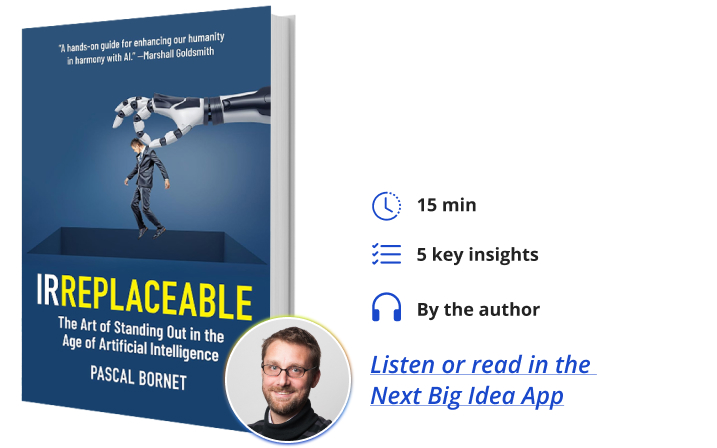Pascal Bornet is an expert in artificial intelligence. For the last 25 years, as a former executive at consulting firms McKinsey and EY, he has implemented AI projects for hundreds of companies around the world.
Below, Pascal shares five key insights from his new book, Irreplaceable: The Art of Standing Out in the Age of Artificial Intelligence. Listen to the audio version—read by Pascal himself—in the Next Big Idea App.

1. Why it’s urgent that we all become irreplaceable.
We’re standing at the edge of a massive shift in artificial intelligence. Becoming irreplaceable isn’t just crucial—it’s urgent. Let me introduce the concept I call “AI obesity.” Just like we got hooked on fast food, we’re now binging on fast creativity, fast connections, and fast decisions. We’re settling for “good enough” instead of striving for excellence, and we’re losing our jobs, businesses, and humanity in the process.
But AI itself isn’t the problem. It’s like food: not inherently good or bad; it’s all about how you consume it.
“We’re settling for “good enough” instead of striving for excellence, and we’re losing our jobs, businesses, and humanity in the process.”
AI offers great benefits but also dangers. To thrive, we need the right competencies. That’s why I’ve developed the Three Competencies of the Future framework. These competencies are about being AI-Ready, Human-Ready, and Change-Ready. They’re designed to help individuals and businesses not just survive but thrive in this AI-driven world.
The urgency comes from the pace of change. We no longer have time to retrain for new jobs before the old ones disappear. We must act now to become irreplaceable.
2. The AI-Ready competency.
AI-Ready isn’t just about knowing how to use the latest AI tools. It’s about fundamentally changing how we approach work and life in an AI-driven world.
For individuals, being AI-Ready means three key things:
- Develop an AI mindset. This means prioritizing efficiency over effort, value over volume, and collaboration over control. It’s about working smarter, not harder.
- Strategically leverage AI. This means identifying which tasks can be automated or enhanced by AI and which require human touch.
- Maintain AI literacy. The tech landscape is changing rapidly, and you need to keep up.
For businesses, being AI-Ready extends beyond implementing AI systems. It’s about fostering an AI-embracing culture, ensuring ethical AI use, and mitigating AI-related risks. Central to this is building trust with employees, clients, and partners through transparency in AI implementation and clear communication about AI’s role. For example, companies must be open about AI’s use in decision-making and demonstrate how it benefits all stakeholders. This trust is fundamental to the future of AI in business.
I’ve witnessed companies transform their operations and individuals dramatically increase productivity by becoming AI-Ready.
3. The Human-Ready competency.
The Human-Ready competency is counterintuitive. As AI handles more human capabilities, success lies in doubling down on our uniquely human traits, not just learning to code. Our human abilities become our greatest asset, allowing us to work in synergy with AI and do things that neither humans nor AI could do alone.
I’ve identified three unique human abilities that AI can’t authentically replicate, which I call the Humics: genuine creativity, critical thinking, and social authenticity. These abilities are deeply rooted in our personal experiences, emotions, and human essence:
- Genuine creativity emerges from unique personal experiences and emotional depths—areas where AI can only recombine ideas, not create new ones.
- Critical thinking goes beyond AI’s data processing capabilities, involving nuanced judgment and ethical considerations that only humans can provide.
- Social authenticity: while AI can simulate interactions, only humans can build deep, meaningful connections based on shared consciousness and genuine empathy.
For businesses, being Human-Ready means fostering a culture that values and nurtures these human capabilities. In a business world where companies leverage the same AI systems, the difference lies in strategically combining AI and human capabilities. It’s about creating environments where creativity can flourish, critical thinking is encouraged, and authentic human connections are prioritized.
4. The Change-Ready competency.
In my years of research and consulting, I’ve come to realize that this might be the most crucial competency of all. I strongly believe that in the Age of AI, success isn’t determined by strength or intelligence, but by one’s capacity to adapt to change.
Here’s why: AI isn’t just changing things. By enabling the faster creation of new technologies, it’s accelerating the pace of change itself. We’re seeing disruptions happening faster and more frequently than ever before. In the coming ten years, we should expect to witness as many innovations as in the last century.
For individuals, being Change-Ready means developing resilience and adaptability. For businesses, it’s about creating structures and cultures that thrive amid disruption, fostering innovation and flexibility.
“In the coming ten years, we should expect to witness as many innovations as in the last century.”
Change-Readiness isn’t just about reacting to change; it’s about anticipating and stimulating change. I love the example of Toyota, which deliberately creates internal disruptions to keep the company adaptable and innovative. To train myself to change, I have chosen to live and work in several different places over the last 15 years, including Paris, Singapore, Shanghai, San Francisco, and Miami. I’ve developed specific techniques to build resilience, drawing inspiration from sources as diverse as neuroscience and nomadic cultures. For instance, I teach a breathing technique inspired by the Tuareg people of the Sahara that can help build mental resilience.
Those who master this competency will see opportunities where others see threats, pivoting and innovating in the face of disruption.
5. Reimagining education for the AI era.
Our current education system, designed for the Industrial Age, is woefully inadequate for preparing kids for an AI-driven world. We’re still focusing on memorization and standardized testing when we should be nurturing the Humics: creativity, critical thinking, and emotional intelligence.
I propose a radical shift. Instead of banning AI in schools, we should teach kids how to work with AI effectively and ethically. Imagine a classroom where students use AI to enhance their learning and are taught to critically evaluate AI-generated information and add their human touch.
This is about preparing kids for a future where the nature of work itself might be radically different, impacting their life purposes. It’s also about teaching kids how to learn, unlearn, and relearn because in a rapidly changing world, this is the most crucial skill of all.
To listen to the audio version read by author Pascal Bornet, download the Next Big Idea App today:
































